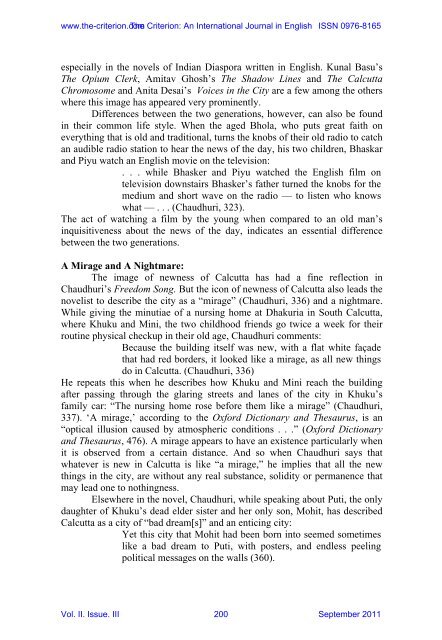Vol. II. Issue. III September 2011 - The Criterion: An International ...
Vol. II. Issue. III September 2011 - The Criterion: An International ...
Vol. II. Issue. III September 2011 - The Criterion: An International ...
You also want an ePaper? Increase the reach of your titles
YUMPU automatically turns print PDFs into web optimized ePapers that Google loves.
www.the-criterion.com <strong>The</strong> <strong>Criterion</strong>: <strong>An</strong> <strong>International</strong> Journal in English ISSN 0976-8165<br />
especially in the novels of Indian Diaspora written in English. Kunal Basu’s<br />
<strong>The</strong> Opium Clerk, Amitav Ghosh’s <strong>The</strong> Shadow Lines and <strong>The</strong> Calcutta<br />
Chromosome and <strong>An</strong>ita Desai’s Voices in the City are a few among the others<br />
where this image has appeared very prominently.<br />
Differences between the two generations, however, can also be found<br />
in their common life style. When the aged Bhola, who puts great faith on<br />
everything that is old and traditional, turns the knobs of their old radio to catch<br />
an audible radio station to hear the news of the day, his two children, Bhaskar<br />
and Piyu watch an English movie on the television:<br />
. . . while Bhasker and Piyu watched the English film on<br />
television downstairs Bhasker’s father turned the knobs for the<br />
medium and short wave on the radio –– to listen who knows<br />
what –– . . . (Chaudhuri, 323).<br />
<strong>The</strong> act of watching a film by the young when compared to an old man’s<br />
inquisitiveness about the news of the day, indicates an essential difference<br />
between the two generations.<br />
A Mirage and A Nightmare:<br />
<strong>The</strong> image of newness of Calcutta has had a fine reflection in<br />
Chaudhuri’s Freedom Song. But the icon of newness of Calcutta also leads the<br />
novelist to describe the city as a “mirage” (Chaudhuri, 336) and a nightmare.<br />
While giving the minutiae of a nursing home at Dhakuria in South Calcutta,<br />
where Khuku and Mini, the two childhood friends go twice a week for their<br />
routine physical checkup in their old age, Chaudhuri comments:<br />
Because the building itself was new, with a flat white façade<br />
that had red borders, it looked like a mirage, as all new things<br />
do in Calcutta. (Chaudhuri, 336)<br />
He repeats this when he describes how Khuku and Mini reach the building<br />
after passing through the glaring streets and lanes of the city in Khuku’s<br />
family car: “<strong>The</strong> nursing home rose before them like a mirage” (Chaudhuri,<br />
337). ‘A mirage,’ according to the Oxford Dictionary and <strong>The</strong>saurus, is an<br />
“optical illusion caused by atmospheric conditions . . .” (Oxford Dictionary<br />
and <strong>The</strong>saurus, 476). A mirage appears to have an existence particularly when<br />
it is observed from a certain distance. <strong>An</strong>d so when Chaudhuri says that<br />
whatever is new in Calcutta is like “a mirage,” he implies that all the new<br />
things in the city, are without any real substance, solidity or permanence that<br />
may lead one to nothingness.<br />
Elsewhere in the novel, Chaudhuri, while speaking about Puti, the only<br />
daughter of Khuku’s dead elder sister and her only son, Mohit, has described<br />
Calcutta as a city of “bad dream[s]” and an enticing city:<br />
Yet this city that Mohit had been born into seemed sometimes<br />
like a bad dream to Puti, with posters, and endless peeling<br />
political messages on the walls (360).<br />
<strong>Vol</strong>. <strong>II</strong>. <strong>Issue</strong>. <strong>II</strong>I 200 <strong>September</strong> <strong>2011</strong>
















